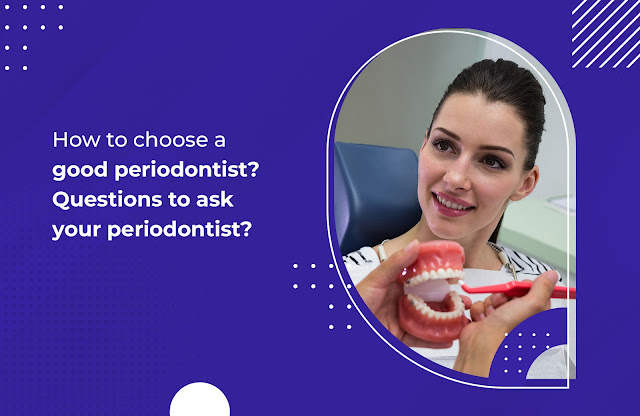How to Choose a Good Periodontist? Questions to Ask Your Periodontist?
A periodontist specializes in the diagnosis and treatment of gum disease in addition to implant dentistry. Gum disease or periodontal disease can affect oral health and impact your smile. It usually starts with a bacterial infection in the gum tissue. But, if left undiagnosed, it can result in gum recession and tooth loss.
So, if you are facing problems with your gum, such as bleeding or mild pain, consider visiting a periodontist. But if you have not seen a periodontist before and have no idea where to go, fret not. This blog will give you a clear understanding of how to choose a good periodontist. Moreover, reveal the most important questions to ask your periodontist to ensure a successful treatment.
What to Look for When Choosing a Good Periodontist
There are several things to consider when finding a good periodontist. It is okay if you do not know where to start. Here are a few essential things to consider before making your decision.
Education and Certifications
So, a periodontist must have a four-year undergraduate college degree. Your periodontist must have graduated from an accredited dental school and have a DDS (Doctor of Dental Surgery) or DMD (Doctor of Medical Dentistry) degree. In addition, a periodontist should receive three to seven years of professional training from an ADA (American Dental Association) accredited program of periodontics.
Available Treatment Options
Most periodontists offer similar services. But, sometimes, the periodontists may not provide the procedures related to your periodontal condition. So, ask your periodontist what periodontal procedures they offer & If they also include laser gum depigmentation or dental implants you may require.
Experience
It is crucial to know how long the periodontist has been in practice. This will give insights into their expertise in the treatment of periodontal diseases. Additionally, it will help you to choose a periodontist as per your preference and ensure a satisfying experience. Remember, a periodontist must be recertified every six years to continue education and other professional training to stay up to date with current knowledge and competence in periodontics.
Office Hours and Location
It is wise to choose a periodontist nearby your location. So, narrow down the list of the best periodontists near you and note their office hours. Then, consider the periodontist that meets your treatment requirements and is nearby. It ensures convenience and prompt treatment.
After you have chosen a good periodontist, it is time to visit their clinic. So, when you see your periodontist, ask a few questions. It will ensure you know the whereabouts of your oral health. Moreover, asking questions to your periodontist will help you understand your treatment options better.
Questions To Ask Your Periodontist
In this section, Dr. Sam Wise (DDS, MOM, MSc, and MDS), a highly experienced periodontist in Texas, United States, gives you a list of questions you should ask your periodontist to help you in your journey of finding a good periodontist.
Here are some basic questions you may consider asking your periodontist:
What are the cost, insurance, and financing options?
Your periodontal treatment should not be financially burdening. So, ensure that the most significant part of your treatment costs are covered. Since every dental office has a different payment structure, it is wise to know your financing options. So, ask your periodontist about the costs associated with the periodontal treatment plan offered. It will help you make an informed decision and keep you stress-free throughout your treatment.
Does my periodontal condition need sedation during treatment? If yes, what are the available sedation types?
While many periodontal treatments can be done without the use of dental sedation, it is important to know the types. Moreover, it is more important to know if your periodontist is certified to administer IV sedation.
What kinds of equipment and or technology does the dental practice offer?
Suppose the periodontists you choose have extensive years of experience, but do they have the latest technology? The top technologies used in periodontics are lasers, digital X-rays, cone beam CT scans, Intraoral cameras, 3d printing technology, etc. With the help of these technologies, a periodontist can ensure quality patient care and achieve better results faster.
Does the dental practice offer emergency care if needed?
It is another important question you shouldn’t miss asking your periodontist. So, looking for a periodontist who also provides emergency care is optimal for your safety. Sometimes, even during ongoing periodontal procedures, patients may experience common periodontal emergencies such as severe mouth pain and unexplained bleeding. That’s when emergency periodontal care helps.
The Takeaway
It is crucial to see a periodontist if you experience any of the symptoms of gum disease. Routine evaluation helps detect gum diseases early. Dr. Sam Wise (DDS, MOM, MSc, and MDS), a well-known periodontist, says regular periodontal examinations should be a part of your oral health care regimen. Dr. Sam Wise also recommends you visit a periodontist regularly if you have diabetes, respiratory conditions, or smoke regularly, as all have links to periodontal disease.

Comments
Post a Comment